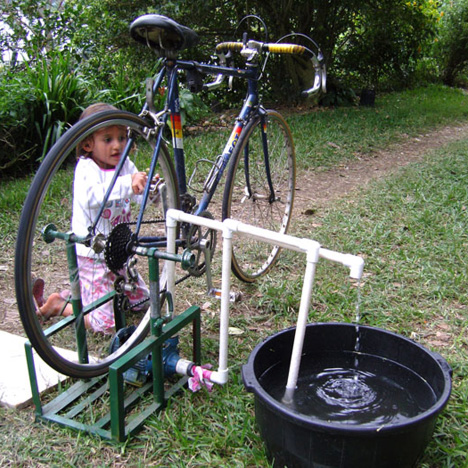From Cycling to Upcycling: Maya Pedal's "Bicimaquinas"
Bicycles are all the rage these days; Interbike notwithstanding, we've seen several concepts lately, from the FLIZ to the CERV (and most recently the unacronymous Bicymple), each an attempt to evolve beyond the traditional diamond frame.

Yet the pedal-powered drivetrain is as tried-and-true as they come, and a Guatemalan (via Canada) nonprof has demonstrated its efficiency and versatility time and again. It's not quite as quintessentially lo-fi as Liter of Light, but Maya Pedal's remarkable upcycling project is a veritable post-industrial revolution for rural Guatemalans... and potentially for underdeveloped communities the world over. The San Andrés Itzapa-based NGO accepts donated bicycles from the US and Canada, which are either refurbished and sold or, more interestingly, converted into "Bicimaquinas" (pedal-powered machines).Pedal power can be harnessed for countless applications which would otherwise require electricity (which may not be available) or hand power (which is far more effort). Bicimaquinas are easy and enjoyable to use. They can be built using locally available materials and can be easily adapted to suit the needs of local people. They free the user from rising energy costs, can be used anywhere, are easy to maintain, produce no pollution and provide healthy exercise.
 The Bicimolino pedal-powered mill/grinder
The Bicimolino pedal-powered mill/grinder
In short, Maya Pedal turns scrap bicycle parts into all variety of human-powered municipal machinery: "water pumps, grinders, threshers, tile makers, nut shellers, blenders (for making soaps and shampoos as well as food products), trikes, trailers and more."
Our friends over at Makeshift Magazine nicely sum up the 15-year-old organization's social impact, noting that "Maya Pedal was founded in the wake of the Guatemalan Civil War, when volunteers from PEDAL, a Vancouver-based organization dedicated to bicycle-powered development, partnered with Guatemalan leaders... [with] the donation of thousands of bicycles from the Massachusetts-based Bike Not Bombs."The bicimaquinas make a tangible difference for campesino villagers. The bike frames, handlebars, and drivetrains conserve time, money, and labor for farmers across the region. The bicimolino corn mill and bicilavadora washing machine save energy—both physical and fossil—for women who once completed these tasks by hand every day. Hand-powered alternatives demand time and effort, and the cost of fuel puts gas-powered ones out of reach for most...
 The Bicibomba can pump water at 5–10 gallons per minute from wells
The Bicibomba can pump water at 5–10 gallons per minute from wellsThe underlying genius of the bicimaquinas lies not just in their function or the customization of their parts but also in Maya Pedal's vision for using the raw bike parts as a medium for connecting people locally and globally. Maya Pedal espouses the idea of building social capital—the value emerging from the relationships between people. This differs from physical or human capital in that it is about intangible connections—social networks derived from norms of reciprocity and trustworthiness, to paraphrase sociologist Robert Putnam. While the bicimaqunias serve villagers in achieving their specific purpose—grinding corn, pumping water, or washing clothes—it is the collaborative innovation among engineers in San Andres Itzapa and their North American partners which has bred a sustainable solution with promise for rural communities worldwide.

Check out MayaPedal.org to find out more—support the cause with a donation or, if you're feeling particularly inspired, download instructions, fact sheets or even SketchUp plans for some of their more popular models.
-
oFavorite This
-
QComment
K
{Welcome
Create a Core77 Account
Already have an account? Sign In
By creating a Core77 account you confirm that you accept the Terms of Use
K
Reset Password
Please enter your email and we will send an email to reset your password.

